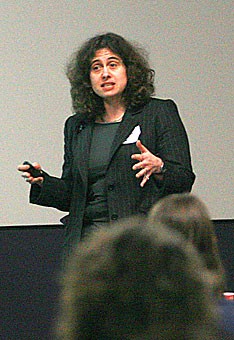The UA BIO5 Institute, in collaboration with the Arizona Cancer Center and molecular and cellular biology department, hosted leading scientists from around the world for the first major scientific symposium in the new Thomas W. Keating Bioresearch building Saturday.
The Epigenetic Control of Gene Expression and Inheritance Symposium drew more than 120 researchers, students and scientists to the new building to listen to six speakers from Austria, England, Canada and the U.S.
Maureen Peterson, a first-year genetics graduate student, said because of the symposium, she wants to do further research in epigenetics, which she explained as the difference in gene expression levels that occur from modifications of the DNA molecule, not on changes of the DNA sequence itself.
In the last five to 10 years, the additional mechanisms superimposed upon the underlying DNA sequence that form the genetic basis of the template of gene regulation have become the focus for scientists, said Vicki Chandler, director of the BIO5 Institute and a professor of plant sciences and molecular and cellular biology.
Scientists believe the effects include a number of human neurological diseases and agricultural and environmental applications, Chandler said.
“”It is a really fast-growing, exciting field,”” she said. “”And we are very, very pleased at the caliber of speakers that agreed to come.””
Susan Guthrie, director of marketing and communications at BIO5, said the focus of the symposium is that cutting-edge research will help local scientists because they can learn opinions and methods from other researchers.
Giovanni Bosco, an assistant professor of molecular and cellular biology, said the most rewarding part of the symposium is meeting other scientists.
“”The most exciting part about being here is being able to interact with these world-class scientists who are pioneers in this field and to be able to ask them directly questions and share what their latest research discoveries have been,”” Bosco said.
“”It’s one thing to open up a scientific journal and read about their research,”” he said. “”But it’s a whole other experience to actually hear them talk about it themselves because they convey their enthusiasm of their research that they are doing in a way that cannot be conveyed when you write an article in a journal.””
The symposium allowed for “”really, really smart people”” to interact with UA students, professors and technicians, who otherwise would not be given the opportunity in Tucson because it is isolated from the scientific community, Bosco said.
Saturday’s symposium followed BIO5’s philosophy, which is designed around research collaboration among diverse disciplines, including medicine, agriculture, pharmacy, engineering and basic science. The institute sponsors research ranging from finding a cure for valley fever to looking at smart drugs that target cancer cells, Guthrie said.
“”We don’t believe in working in silos,”” Guthrie said. “”We bring people together, the best experts in the world, to share what their research findings are so that researchers here from Arizona can benefit from that knowledge.””
Ramin Yadegari, an assistant professor of plant sciences, said BIO5 was an ideal place to host the epigenetics symposium because the institute is cross-disciplinary and epigenetics is a cross-disciplinary field.
“”The UA is ranked 14th in the country as a research institute, and (the symposium) will hopefully raise the exposure of the institute and showcase the research that is going on here,”” Yadegari said.
Bosco said, “”I think Tucson is already on the scientific map, but it is certainly making the dot a little bit bigger.””









